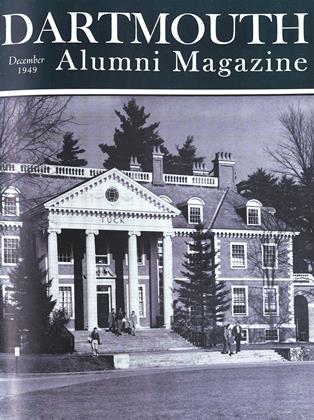ANEW COURSE whose only prerequisite is an ignorance of the English langauge is being offered this year at Dartmouth College.
Taught by Prof. F. Cudworth Flint, the class is made up of 15 foreign students from 14 different countries. One of these students escaped from his native land with the aid of a salt smuggler. Another is the son of a former Lithuanian prime minister.
And while their classmates are studying "foreign" languages such as French or Spanish, these 15 European and Oriental students are busy taking a language course strictly American in its aims and subject matter.
To help them understand America better, Prof. Flint's course stresses the works of such authors as Willa Cather and Sinclair Lewis—writers whose books reflect some of this country's background and characteristics.
Short themes on subjects like "How I Got to Dartmouth" and "What I Call a Good Meal in My Country" help the student to recognize similarities as well as differences between countries.
The ways in which each got to the U. S. are as varied as their backgrounds. Some of them were able to come by plane, as did Abdul S. Bahrani who flew to New York from Damascus. Others traveled by ocean liner as did Gustaf B. Hullman, who was a passenger on the "Gripsholm" from Sweden. Several others, whose identity in this connection had best remain a secret, had to sneak out of their native lands in order to escape their persecutors.
Bahrani describes New York as glowingly as do the tales in the Arabian Nights of his fabulous native city of Baghdad. He was bowled over by "the high buildings trying to reach the clouds .... the big stores where everything can be found.... the wide streets full of beautiful cars."
It took seven years for the family of Vytas J. Cernius, son of a one-time prime minister of Lithuania, to reach this country. In Germany for the last seven months of the war, Cernius knows what it is to be bombed and how it feels to be hungry. He too was impressed with New York's skyscrapers, but even more by the number of cars. Best of all he says, "Nobody carries identification papers here. That is freedom."
After successfully overcoming many obstacles, Arno Arrak, an Estonian, was temporarily detained at Ellis Island. "An immigration official," Arrak relates, "said I could go back to Estonia, meaning, of course, make myself a Soviet citizen. I would like to have told him to go there himself."
Although several of the students made difficult getaways, Thomas G. Song, formerly of Korea, had one of the most discouraging experiences. Just before his ship sailed, he saw all of his family's funds appropriated by a Communist officer, who had discovered that Song's mother, a practising physician, was planning to take her medical supplies and instruments out of the country.
Nikolai Skrylov is a D.P. from Yugoslavia. His father and mother have found work on a nearby New Hampshire farm.
Igor Medvedev, a Russian from Warsaw, is an accomplished artist. Some of his paintings have been exhibited in the college art gallery. One of the first of several D.P. students admitted to Dartmouth, he once did forced labor for the Germans.
But not all members of the class have war backgrounds. George W. Sverdrup from Oslo, Norway, likes the New Hampshire scenery and the idea of skiing at Dartmouth; David R. Wang from China wants to understand this country's culture; Hans-Peter Lenzlinger, a Swiss, is most interested in our industrial methods and working people. He has traveled extensively here. Jacques P. Heymans, a Belgian, and Eggert Benzon, a Dane, came to the U. S. and ultimately to Dartmouth because of their families' interest in the U. S.
Hullman, a Swede, however, offered one good reason why American boys should go to his country. "From what I saw of the spectators at last Saturday's football game, it seems to me that Dartmouth students prefer blonds. In my country they would find themselves in paradise because' all the Swedish boys prefer brunettes."
Prof. Flint's course also serves as a conversation forum. It would be a rather confusing place if all 15 students talked at the same time in their native tongues, but because of the similarity in their languages, the German and the Dutch boys can converse together, the Korean can help the Chinese with assignments, and the Yugoslav can aid the Russian.
And it doesn't take long for them to pick up American schoolboy slang—for at least one was overheard explaining to another in halting English what it means "to polish the apple."
A PRE-ENGLISH COURSE IN ENGLISH, conducted by Professor Cudworth Flint for the benefit of foreign students not ready to take the required freshman reading in the Bible and Chaucer, includes (I. to r.) Heymans from Belarum Skrylov, Yugoslavia; Bahrani, Iraq; Arrak, Esthonia; Philips, Holland; Adam,, Germany; Professor Flint; Benzen, Denmark; Sverdrup, Norway; Hullman, Sweden; Lenzl.nger, Switzerland; Wang, China; Cernius, Lithuania; Song, Korea; Medvedev, Russia.
 View Full Issue
View Full Issue
More From This Issue
-
 Article
ArticleOUR GREATEST ISSUE
December 1949 By BRUCE W. KNIGHT -
 Article
ArticleNew Development Council Formed
December 1949 -
 Class Notes
Class Notes1923
December 1949 By TRUMAN T. METZEL, COLIN C. STEWART, JULIUS A. RIPPEL -
 Class Notes
Class Notes1918
December 1949 By ERNEST H. EARLEY, DONALD L. BARR, DAVID L. GARRATT -
 Class Notes
Class Notes1943
December 1949 By ELMER G. STEVENS JR., STANTON E. PRIDDY -
 Article
ArticleIt's An Old Spanish Custom of Speech
December 1949 By CHARLES L. YOUMANS '20
Article
-
 Article
ArticleSECRETARIES MEET IN APRIL
February 1921 -
 Article
ArticleMedical, Tuck, Faculty and Honorary Contributors to Fund
March 1938 -
 Article
ArticleBig Green Teams
JULY 1972 -
 Article
Article“There is Infinite Freedom Between Each Beat of Music.”
NOVEMBER | DECEMBER 2013 -
 Article
Article1950
MAY | JUNE 2016 By —Nev Chamberlain -
 Article
ArticleA Bulldog Barks at Alma Mater
NOVEMBER 1931 By H. S. Buxbaum '31


